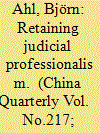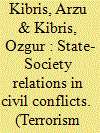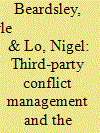|
|
|
Sort Order |
|
|
|
Items / Page
|
|
|
|
|
|
|
| Srl | Item |
| 1 |
ID:
107967


|
|
|
|
|
| Publication |
2011.
|
| Summary/Abstract |
International relations scholars have garnered a good deal of evidence indicating that binding arbitration and adjudication are highly effective means for brokering agreements and ending conflict. However, binding third-party conflict management is rarely pursued to resolve interstate disputes over contentious issues like territorial or maritime control. While states value the effectiveness of binding procedures, they are reluctant to give up the decision control necessary to submit to arbitration or adjudication. The authors identify three factors that influence the willingness of states to give up decision control: issue salience, availability of outside options, and history of negotiations. An analysis of attempts to settle territorial, maritime, and river claims reveals that disputants are less likely to use binding conflict management when they have a greater need to maintain decision control.
|
|
|
|
|
|
|
|
|
|
|
|
|
|
|
|
| 2 |
ID:
178687


|
|
|
|
|
| Summary/Abstract |
This article introduces the Peaceful Resolution of Territorial Disputes (PRTD) dataset, covering all interstate territorial disputes (1945–2015). Our dataset captures proposals for the peaceful resolution of territorial disputes made by states involved in territorial claims at the disputant-year level. These proposals provide a concrete measure of changing state preferences toward negotiations, non-binding, and binding third-party dispute resolution methods over time. In contrast to existing attempt-level data, the monadic panel design of the dataset captures not only actual attempts at peaceful resolution – the result of an agreement between disputants – but also proposals for methods that did not occur but were preferred at a particular time point. Our dataset allows for robust and generalizable quantitative analyses of the peaceful resolution of territorial disputes that are sensitive to temporal, regional, claim-based, and state-level trends. To demonstrate the utility of our dataset, we use hybrid logistic regression to examine the determinants of binding PRTD proposals. Over-time changes in characteristics such as regime type and treaty commitments influence attitudes toward binding settlement methods differently than disputant-level measurements. We also show that time has a distinctively non-linear effect.
|
|
|
|
|
|
|
|
|
|
|
|
|
|
|
|
| 3 |
ID:
131952


|
|
|
|
|
| Publication |
2014.
|
| Summary/Abstract |
In 2011 and 2012, the Supreme People's Court (SPC) published its first "guiding cases." Guiding cases serve as decision-making models that must be taken into account by lower courts when deciding similar cases. This study argues that the establishment of a national formal legal mechanism to improve consistency in adjudication across jurisdictions and geographical boundaries will strengthen judicial professionalism. The guiding cases system provides the SPC with an instrument to steer adjudication in lower courts discreetly, thereby allowing it to exercise significant influence over legal developments. Given the complexity of cases, compared to law set out in statute, non-lawyers may have tremendous difficulty in understanding and assessing the effects of guiding cases; this in turn acts as a protective mechanism against extra-legal interference. The reform is an example of the SPC's delicate manoeuvring in order to retain judicial professionalism in a hostile yet politically conservative environment. It reflects an attempt by the SPC to strengthen its position vis-à-vis other actors of the party-state and to consolidate the judiciary's function as an adjudicative institution that works on the basis of formal legal mechanisms.
|
|
|
|
|
|
|
|
|
|
|
|
|
|
|
|
| 4 |
ID:
172174


|
|
|
|
|
| Summary/Abstract |
Civil conflicts are conceptualized as asymmetric, population-centric military struggles. The argument is that insurgencies, even though they are no match in military power to their state adversaries in many cases, resort to armed struggle nonetheless as a tool to impair state capacity, the quality of governance, and the ability of the state to honor the “social contract” in order to eventually destroy state authority and render the state irrelevant for the society. Note that this argument implies that state-society relations do react to the military course of the conflict. In this article, we provide empirical evidence for this implication. Introducing a new panel dataset on the long-running civil conflict in Turkey, we first conduct a micro-level analysis and demonstrate the significant impact rebel presence has upon state-society relations across localities and time. We then analyze the results of semi-structured interviews we had conducted with a group of experts from the conflict regions to decipher the possible mechanisms behind the association we observe in the data. The interviews support our motivating theoretical argument.
|
|
|
|
|
|
|
|
|
|
|
|
|
|
|
|
| 5 |
ID:
132351


|
|
|
|
|
| Publication |
2014.
|
| Summary/Abstract |
States involved in territorial disputes have several options with regard to resolving their disputes. What types of states are more likely to resort to legal methods of peaceful resolution in attempting to resolve their territorial disputes? We posit that two separate mechanisms affect states' decisions to choose legal methods of peaceful resolution: the legal mechanism - domestic rule-of-law, and the political mechanism - win/loss record. Rule-of-law based arguments cannot fully explain states' behavior towards arbitration and adjudication. It is the interplay of both of these mechanisms that explains the strategic choices made by states with regards to arbitration and adjudication. We explain why some high rule-of-law states return to binding methods, while others turn to different forums, and why low rule-of-law states consider binding methods. Empirical analyses of all attempts at peaceful resolution of territorial disputes from 1985 to 2006 show that high rule-of-law states are more likely to return to international binding venues only if they have a positive experience with these methods. On the other hand, we find that low rule-of-law states are not concerned with their record of successes/failures when resorting to international binding venues. Overall, the effect of regime type/rule-of-law is conditioned by past successes and failures in international resolution venues.
|
|
|
|
|
|
|
|
|
|
|
|
|
|
|
|
| 6 |
ID:
128986


|
|
|
|
|
| Publication |
2014.
|
| Summary/Abstract |
Third-party conflict management, particularly legal dispute resolution (arbitration and adjudication) and mediation, can help improve the willingness of disputants to make asymmetric concessions by ameliorating commitment problems and providing political cover. In both regards, and especially pertaining to commitment problems, mediation has substantial limitations when compared to legal dispute resolution. We develop these arguments and test the observable implications on the Issue Correlates of War data. To get traction on the mechanisms at work, we distinguish between challenger concessions and defender concessions, positing that challenger concessions face the primary hurdle of political cover while defender concessions face the primary hurdle of commitment problems. We find that legal dispute resolution strongly increases the propensity for concessions by both challengers and targets, even major asymmetric concessions. Mediation, on the other hand, only helps increase minor challenger concessions. Also consistent with expectations, mediation best enables asymmetric challenger concessions in the highly salient cases that need the most political cover, and legal dispute resolution best enables asymmetric concessions when there has been a history of failed conflict management attempts that perpetuate mistrust.
|
|
|
|
|
|
|
|
|
|
|
|
|
|
|
|
|
|
|
|
|